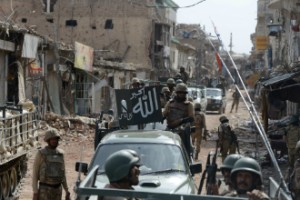More than 700,000 Pakistanis reportedly flee military offensive

This photograph taken on 9 July shows Pakistani soldiers patrol through a destroyed bazaar during a military operation against Taliban militants, in the main town of Miranshah in North Waziristan.
BANNU, Pakistan — More than 700,000 people are reported to have fled a Pakistani military operation against terrorists in North Waziristan, straining nearby towns and heightening concern about a long-term refugee crisis.
The operation is now in its third week, and military commanders stress that they are making considerable gains in their effort to dislodge Pakistani Taliban and other militants from the restive region bordering Afghanistan. But the offensive also has led to a massive displacement of residents, creating new burdens for humanitarian groups already struggling to help Pakistan fight a polio epidemic and recover from several recent natural disasters.
Duniya Aslam Khan, a spokeswoman for the United Nations refugee agency, said an estimated 787,000 residents have left North Waziristan since the military campaign began in mid-June.
The number suggests that nearly all North Waziristan residents have left their homes. Most analysts and government officials had estimated the population of the remote tribal area at 600,000.
"If this is not handled in a proper manner, it could turn into a humanitarian crisis," Khan said. "There is a chance of disease outbreak, people are living in schools, and it's summer — with concerns about measles and diarrhea."
Here in Bannu, in Pakistan's northwestern Khyber Pakhtunkhwa province, where most of the refugees are relocating, the newcomers say they face a cumbersome registration process just to get food.
"This is a disgrace to our people," said Humayun Khan, 46. Like most of the refugees, he is a Pashtun. "We see our people running from the wee hours of the morning to sunset to get some food items. . . and some prefer to die of hunger rather than waiting all dayin the scorching heat."
The military, working off a strategy it employed during anti-Taliban operations in the Swat Valley from 2007 to 2009, pushed residents to leave their homes so it could target militants without risking civilian casualties. North Waziristan had become a haven for the Pakistani Taliban, al-Qaida remnants, the Haqqani network, and Islamist extremists from Uzbekistan and Tajikistan.
Military officials say more than 400 terrorists, including dozens of foreigners, have been killed. But the military has not released their identities. Analysts say many militant leaders probably fled to Afghanistan or deeper into the mountains of North Waziristan before the operation began.
In a recent interview with the Agence France-Presse news agency, a barber from North Waziristan who fled to Bannu said he had cut the beards and hair of more than 700 militants seeking to leave the area unrecognised.
"The militants can go very easily, and you can't recognise them, because they look just like other people," said Ashraf Ali, president of the FATA Research Center, which monitors militant groups.
Still, there has been no major retaliatory strike since the operation began. That suggests the military may be accomplishing its goal of disrupting the groups' ability to plot attacks, Ali said.
Khan, the spokeswoman for the UN refugee agency, said 74 per cent of the displaced residents who have registered for assistance are women and children. Thousands are living in schools that have been closed for the summer, creating uncertainty about where they will relocate if the operation is not completed by the start of the fall term.
Khan said officials also worry that the refugee influx could overwhelm Bannu's public services.
"The infrastructure already was not in good shape," she said.
Haw Nawaz Khan and Tim Craig – The Washington Post
Craig reported from Islamabad, Pakistan.
© Helsinki Times Oy. All Rights Reserved